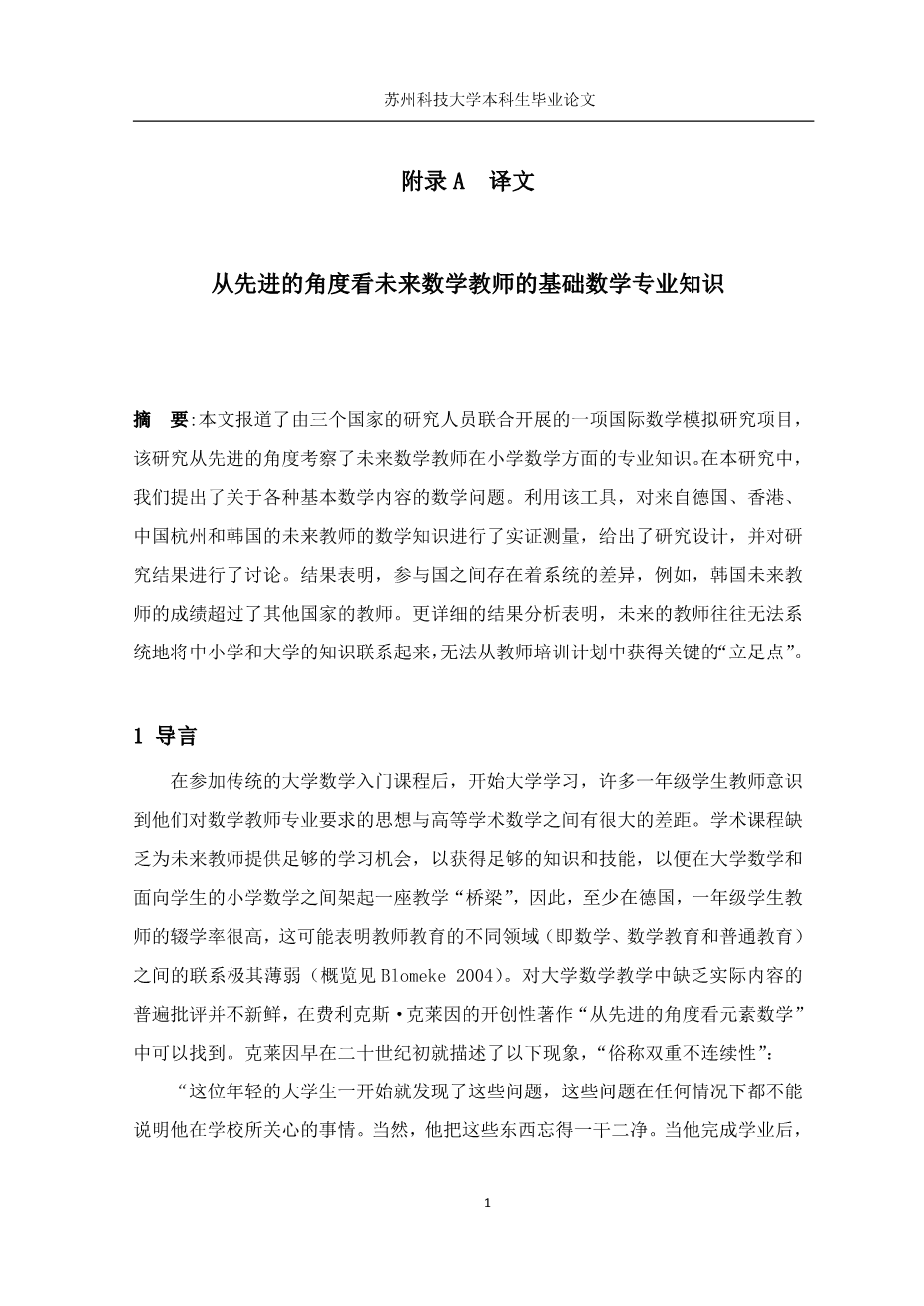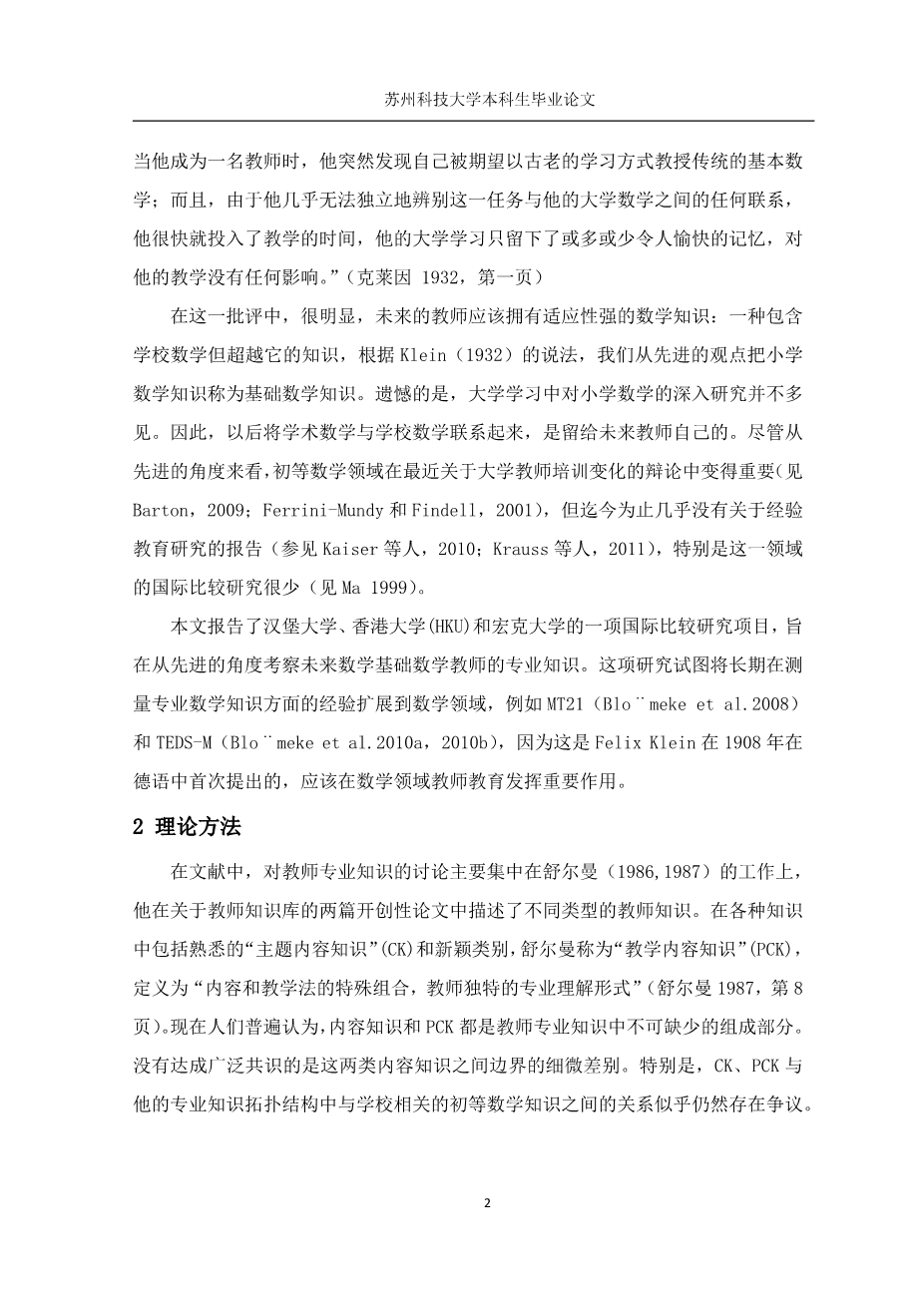Future mathematics teachersrsquo; professional knowledge
of elementary mathematics from an advanced standpoint
Abstract This paper reports a joint research project by researchers from three countries on an international comparative study that examines the professional knowledge of prospective mathematics teachers in elementary mathematics from an advanced standpoint. For this study,mathematical problems on various topics of elementary mathematical content were developed. Using this instrument, the mathematical knowledge of future teachers from Germany, Hong Kong, China (Hangzhou) and South Korea was measured empirically. The paper presents the design of the study, and also results are discussed. The results show that there are systematic differences among the participating countries; for example, the Korean future teachers outperform their counterparts in other countries. A more detailed analysis of the results suggests that the future teachers often do not seem to be able to link school and university knowledge systematically and cannot achieve the crucial “advanced standpoint” from the teacher training programme.
1 Introduction
After taking up their university study when they attend the traditional introductory courses of university mathematics, many first-year student teachers realize the big gap between their ideas of the professional requirements of the mathematics teacher, on the one hand, and the advanced academic mathematics, on the other hand. The academic courses lack provision of learning opportunities for future teachers to sufficiently acquire the knowledge and skills for constructing a didactical “bridge” between university mathematics and student-oriented elementary mathematics. As a consequence, at least in Germany, there are high dropout rates amongst first-year student teachers, which may be an indication that the connection among the different areas of teacher education (namely mathematics, mathematics education, and general education) is critically regarded as too weak (for an overview, see Blomeke 2004). The general criticism of the absence of practical content in the teaching of mathematics at universities is not new and can be found in the ground-breaking book Elementary Mathematics from an Advanced Standpoint by Felix Klein, who as early as the beginning of the twentieth century described the following phenomenon, commonly known as the “double-discontinuity”:
“The young university student found himself, at the outset, confronted with problems that did not suggest, in any particular, the things with which he had been concerned at school. Naturally he forgot these things quickly and thoroughly. When, after finishing his course of study, he became a teacher, he suddenly found himself expected to teach the traditional elementary mathematics in the old pedantic way; and, since he was scarcely able, unaided, to discern any connection between this task and his university mathematics, he soon fell in with the time honored way of teaching, and his university studies remained only a more or less pleasant memory which had no influence upon his teaching.”(Klein 1932, p. 1)
In this criticism, it becomes obvious that prospective teachers should have adaptable mathematical knowledge: a knowledge that comprises school mathematics, but goes beyond it and relates it to the underlying advanced academic mathematics, which according to Klein (1932) we call the knowledge of elementary mathematics from an advanced standpoint. Unfortunately, elementary mathematics in its depth is not often treated in university study, and therefore it is left to the future teachers themselves to later link the academic mathematics and school mathematics when they enter the profession. Although the area of elementary mathematics from an advanced standpoint has become important in recent debates on changes in university teacher training (see Barton 2009; Ferrini-Mundy and Findell 2001), there has been almost no empirical educational research reported so far (cf. Kaiser et al. 2010; Krauss et al. 2011). In particular, there exist only very few international comparative research studies in this area (see, e.g., Ma 1999).
This paper reports a joint research project of the University of Hamburg, the University of Hong Kong (HKU) and the Hongik University on an international comparative study that aimed at examining the professional knowledge of prospective mathematics teachers in elementary mathematics from an advanced standpoint. The study attempted to extend the long-term experience in the measurement of professional knowledge in mathematics in studies such as MT21 (Blomeke et al. 2008) and TEDS-M (Blomeke et al. 2010a, 2010b) to a field of mathematics which—since it was promoted by Felix Klein in 1908 in German for the first time—should play a significant role in teacher education.
2 Theoretical approach
In the literature, the discussion on professional knowledge of teachers has been mainly focused on the work of Shulman (1986, 1987), who delineated different kinds of teacher knowledge in two seminal papers on the knowledge base of teachers. Among the various kinds of knowledge were the familiar category of “subject matter content knowledge”(CK) and a novel category, which Shulman termed “pedagogical content knowledge”(PCK) and defined as “that special amalgam of content and pedagogy that is uniquely the province of teachers, their own special form of professional understanding”(Shulman 1987, p. 8). It has now been widely acknowledged that both content knowledge and PCK are indispensable components of a teacherrsquo;s professional knowledge. What has not reached wide agreement is the nuance of the boundary between the two categories of content knowledge. In particular, the relations among CK, PCK and knowledge of school-relevant elementary mathematics within Shulmanrsquo;s t
剩余内容已隐藏,支付完成后下载完整资料


英语译文共 22 页,剩余内容已隐藏,支付完成后下载完整资料
资料编号:[404955],资料为PDF文档或Word文档,PDF文档可免费转换为Word


